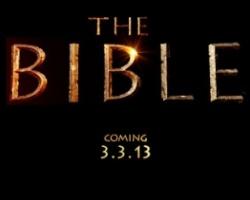Has History Channel’s Miniseries Sparked Interest in the Good Book?
Get downloadable PowerPoint presentation.
What Happened:
The Bible is, far and away, the biggest bestseller in publishing history. More than 2.5 billion copies have been printed since its inception. Still, for all its success not many people have read it. Maybe they were waiting for the movie—or least the miniseries.
For the past several weeks, the History Channel has been airing a miniseries called “The Bible,” which has taken viewers on a whirlwind tour of the Good Book. Similar to its source material, it’s been a runaway success.
The first episode in the series was the most-watched cable television show of the year, drawing more than 13 million people. More than 80 million folks watched the show (not counting April 1’s finale), making it the No. 1 most-downloaded show on iTunes and trending big time on Twitter. With the DVD and Blu Ray versions of the miniseries releasing on April 2, “The Bible” juggernaut shows little signs of slowing.
According to the Barna Group, a Christian researching and polling organization, 69 percent of viewers learned something new by watching the miniseries—including six in 10 active Christians. Perhaps surprisingly, 27 percent of viewers were non-Christians who generally learned quite a bit from the show. In terms of age, young adults between the ages of 18 and 28 were the most likely to glean new insight from the miniseries.
Of course, some of that new knowledge might be stuff that wasn’t in the Bible at all. The miniseries is an adaptation of the Bible, not a straight retelling; the makers took some liberties with chronology and other details—including giving angels some impressive martial arts moves when Lot and his family were fleeing Sodom. (In the book, Sodom’s residents simply were stricken with blindness, not thwacked by angelic beings.)
Creators Mark Burnett and Roma Downey were interested in sparking new interest in the book itself. “We wanted to show how the Old Testament connects seamlessly to the New Testament,” Burnett and Downey wrote for The Huffington Post. “How they are one sweeping story with one grand, overriding message: God loves each one of us as if we were the only person in all the world to love.”
Talk About It:
Did you watch “The Bible” on the History Channel? How much did you watch? Did you enjoy it? Did you learn anything new? Was there anything that struck you as unbiblical?
While lots of people watched “The Bible,” comparatively few have read it. In 2012, Christianity Today found that 19 percent of people read the book daily. Do you read your Bible? How often? Have you read the whole thing?
Polls suggest Americans generally don’t know very much about the Bible. A Pew Research Center study found that 45 percent of us know the names of the four gospels (Matthew, Mark, Luke and John), and 29 percent didn’t know Jesus was born in Bethlehem. Do you feel that your biblical knowledge is pretty strong?
Is it important to read the Bible? Why? Are some parts more important than others? Would you like to read it more often? Do you have a favorite book in the Bible?
What the Bible Says:
“Your word is a lamp to my feet and a light for my path” (
“All Scripture is God-breathed and is useful for teaching, rebuking, correcting and training in righteousness, so that the man of God may be thoroughly equipped for every good work” (
“For everything that was written in the past was written to teach us, so that through endurance and the encouragement of the Scriptures we might have hope” (
“For the word of God is living and active. Sharper than any double-edged sword, it penetrates even to dividing soul and spirit, joints and marrow; it judges the thoughts and attitudes of the heart” (
Paul Asay has covered religion for The Washington Post, Christianity Today, Beliefnet.com and The (Colorado Springs) Gazette. He writes about culture for Plugged In and wrote the Batman book God on the Streets of Gotham (Tyndale). He lives in Colorado Springs with wife, Wendy, and two children. Follow him on Twitter.




